Meet the People Vaccinating Over 1 Lakh Sex Workers, Transgenders & Vulnerable For Free
Under their VaxNow initiative, the CovidActionCollab conducted camps for women sex workers, transgenders and their families, offering general health counselling, mental health support, screening for non-communicable diseases, ration kits and free COVID-19 vaccinations across five states.
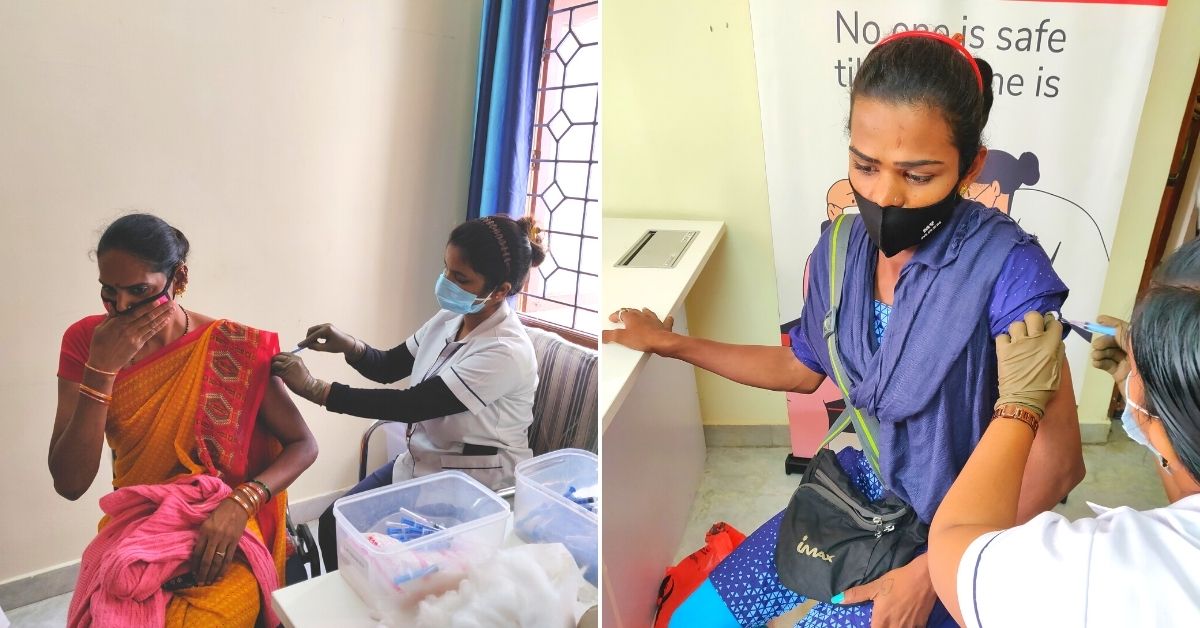
“If you look at the general population, only 30% has been fully vaccinated,” begins Shiv Kumar, a man who has taken on the task of vaccinating those on the peripheries of society against the deadly coronavirus.
“Communities like these are behind formal society on so many metrics, but at least on this initiative we were very keen to put them in the front of the line,” he says.
The social entrepreneur with 27 years of experience in incubating and mentoring social organisations is a part of CovidActionCollab (CAC), a virtual body of 339 members consisting of people from civil society, private organisations, academic institutions and quasi-government associations.
Leading the charge of the CAC’s vaccination drive for WSWs, transgenders and their families are the Catalyst Group and Swasti Health Catalyst, a Bengaluru-based non-profit with Chief Impact Officer G Kallana Gowda.
They came together in March 2020, have as of 20 November 2021 vaccinated nearly 1.24 lakh women sex workers (WSW), transgenders and their families, across 5 states and 30 locations.
Of 1.24 lakh vaccinated under its VaxNow initiative, which began only in August 2021, approximately 62% are WSWs, 2% transgenders and 36% are their family members, they claim.
But of the 1.24 lakh, around 51% have received one dose, while 49% have received both doses. These vaccination camps are happening across 5 states including Karnataka, Maharashtra, Telangana, Andhra Pradesh and Tamil Nadu, and 30 locations. In the city of Bengaluru itself, 11 camps were organised and a total of 3,346 WSWs were vaccinated. At the helm of the CAC is the Catalyst Group, a social enterprise platform, with co-founder Shiv Kumar as chief integrator.
“Our rate of vaccination outreach to WSWs ranks higher thanks to the mobilisation work Kallana and his team have done. In addition to WSWs and transgenders, we have also helped vaccinate factory, domestic and sanitation workers, small farmers, urban slum dwellers and daily wage earners as well. Including the 1.23 lakh WSWs, transgenders and their families, we have helped vaccinate nearly 9 million people from poor and marginalised backgrounds,” claims Shiv.
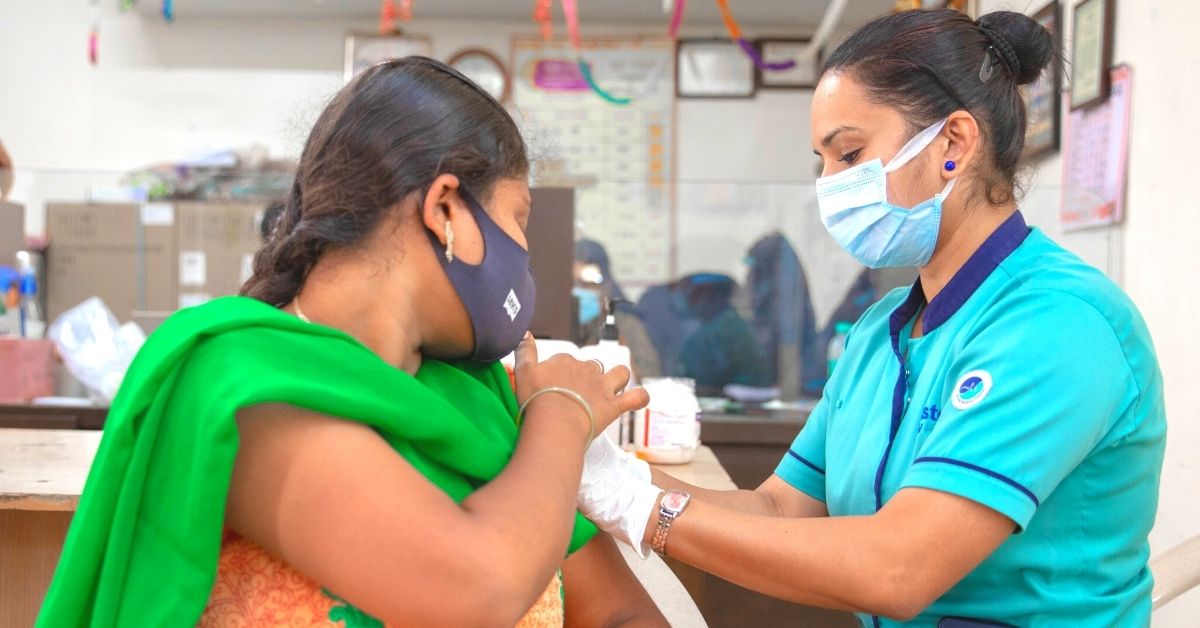
To Vaccinate The Marginalised
With their livelihoods completely shattered and not having access to the kind of help that comes with living in mainstream society, the WSW community were among the worst affected during the first and second wave of COVID-19. Despite immense suffering, many of them still got organised on the frontlines, distributing ART drugs for those afflicted with HIV/AIDS, medicines for diabetics, food and other essentials with little to no funding, notes Kallana.
“Our working relationship with WSW communities began nearly two decades ago. But the majority of the time, the country’s focus with regards to our community has been a single disease focus—which is addressing the risk of HIV. As an organisation, we believe that this isn’t the only health concern of the WSW community. There is anemia, diabetes, hypertension, STI and eyesight related concerns which affects them as well. From 2008 onwards, we started focussing on vulnerability reduction to these common conditions as well. In some ways, our focus on other health issues of WSWs helped us quickly get on the COVID-19 vaccination train, which began with CAC’s VaxNow initiative in August 2021,” says Kallana.
Under their VaxNow initiative, camps were conducted across different cities in Maharashtra and Karnataka in collaboration with other nonprofits working on the ground. In the city of Bengaluru, for example, they were assisted immensely by the Swathi Mahila Sangha (SMS), a community based organisation which closely works with 13,000 WSWs. These camps offered on the spot CoWIN registration, general health counselling, screening for non-communicable diseases such as anemia, hypertension and diabetes, ration kits and free vaccination.
The CAC conducted two types of camps:
Type 1: Partnering with local NGOs and leveraging vaccines from donors such as ACT Grants to organise mass vaccination camps for the most vulnerable community members like WSWs and transgenders. Organisations like the SMS would mobilise the community to get the vaccine.
Type 2: Partnering with the local government health department and leveraging vaccines from the said department to organise mass vaccination camps for WSWs and transgenders. “We decided the locations where these camps would happen and organisations like SMS mobilised members of the community to get the vaccine,” adds Shiv.
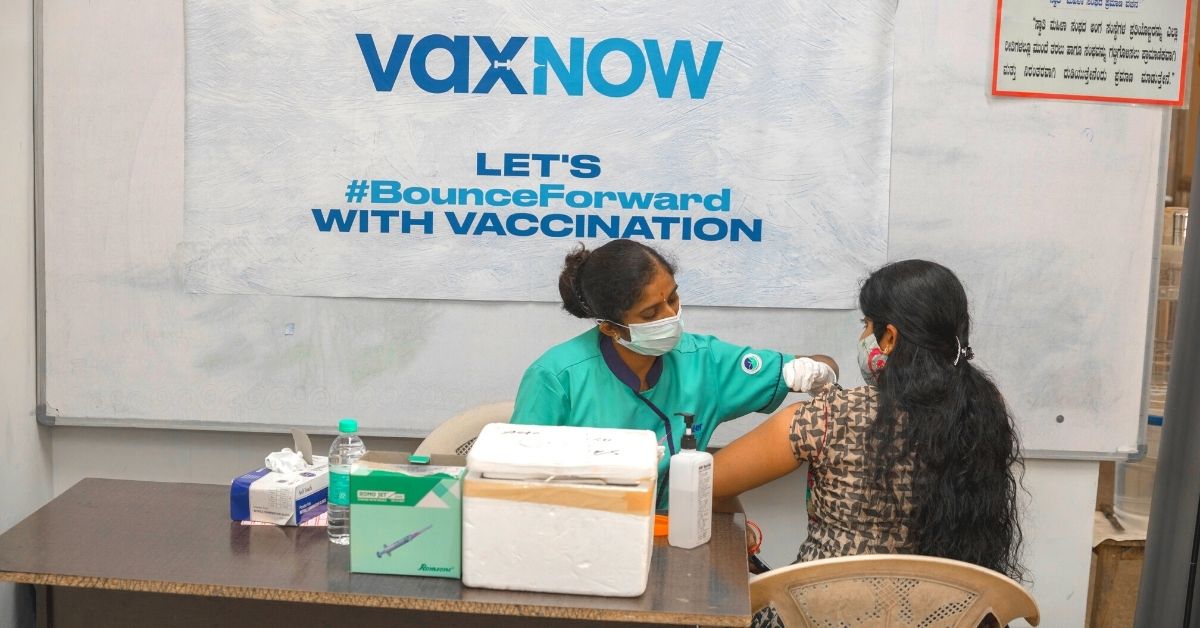
“There are three sub-groups among members of vulnerable communities like WSWs when it comes to the COVID-19 vaccination—people who are eager to get the vaccine but can’t get it, those who are indifferent to the vaccine and aren’t sure whether to take it or not, and finally the vaccine-hesitant ones. The focus of our camps was to reach those living in areas that don’t have basic health facilities. Moreover, many are not comfortable visiting the mainstream vaccination centres that others can because of social ostracisation,” observes Kallana.
In each camp, five different types of services were provided:
1) Raising awareness about prevention and protection from COVID-19
2) Screening for non-communicable disease (NCD) given the dangers of COVID-19 for those with comorbidities, besides mental health counselling. “During the first and second wave of the pandemic, members of our community went through incredible stress,” adds Kallana.
3) Distribution of ration and hygiene kits (face masks, face shields and hand sanitisers) whose contents were decided by the communities. “For example, our ration kits contained sanitary pads because many among our WSW community wanted them,” he says.
4) Provision of medicines that would last a few weeks for conditions they were screened for
5) The CAC’s on-ground partner for the camps in Bengaluru was SMS. Their Peer Educators and Community Champions (outreach workers) took care of on-ground mobilisation of free vaccines and addressed vaccine hesitancy prevalent among women sex workers.
“Peer educators and outreach workers are also members of the WSW community, who assist in providing well-being services like access to formal financial services and social protection schemes by the government. Each peer educator and outreach worker supports about anywhere between 65 to 90 WSW community members. Since there is already an existing network and trust exists between these peer educators/outreach workers and WSWs, they were able to mobilise these community members to these camps. Moreover, all of this is done in a very systematic manner as well,” says Kallana, who directly oversaw these camps.
One week before these camps, peer educators and outreach workers would distribute cards to all WSWs, transgenders and their family members eligible for the vaccine. One card is given to the members of the community, while organisations like SMS retain the other.
This card contains their socio-demographic details, date and details of vaccination camp, NCD status (BP, sugar, blood group, etc.) and also details of their vaccination status (date of dose 1 and dose 2). “Distributing these cards a few days before helps us understand how many people could possibly turn up at a given event. Later, this also helps us keep a record of upcoming second dose dates and those who need further intervention after NCD. Our community can use this card to avail second doses and further health interventions,” says Kallana.
Besides distributing cards, SMS peer educators and outreach workers would also conduct three important interventions:
1) One to one discussions at their homes to help them understand the benefits of the vaccine
2) Organise Aarogya (community) meetings once a fortnight, where these cards are distributed
3) Organise mass community level events to mobilise members for vaccination campaign
“To address vaccine hesitation, we started vaccinating those who were eager to take it. To convince community members, merely talking to them isn’t enough. Those eager for vaccination from the community become ambassadors and influencers, and this opens the gates for those who were earlier indifferent or vaccine hesitant, getting them on board,” he explains.
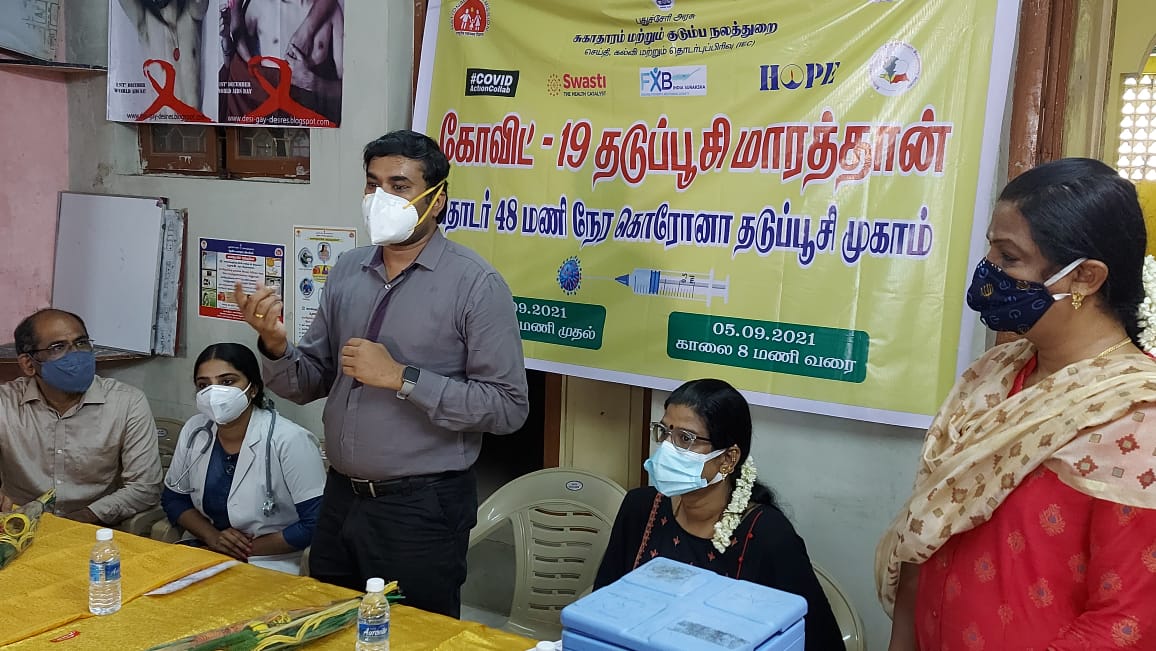
Spirit of Collaboration
Organisations like the SMS have been in the field for the past 15 years. They already have a deep connection to the community and member base. It’s currently working with around 13,000 WSWs in Bengaluru, and already have their outreach team in place.
“The concept of CAC came from our work in tsunami and earthquake relief we’ve done in the past as the Catalyst Group. We learnt a lot from these disasters starting out with understanding the fact that the mobilisation required after the crisis has hit is huge. A lot of money is spent and wasted as well. Given our experience, during the very early days of COVID-19, we knew this was going to be bigger than any tsunami which was going to hit us,” recalls Shiv.
In March 2020, the Catalyst Group had their first governing council meeting to ascertain the size of the problem. Their worst fears were confirmed thanks to the virologists and epidemiologists present at the meeting. That’s when Raghunathan Narayanan, the Founding Director of Catalyst Group and Shiv decided to launch a collaborative effort with a variety of other organisations in their network to address this menace very quickly and the best way they could.
“Cooperation cannot be an afterthought. It needs to be there right at the start. In April 2020, when we launched CAC, we were spot on because that’s when the first cases started picking up. We understood this was a public health crisis and couldn’t sit on the sidelines. The reason why we could set up the CAC so quickly is because we’ve been working closely with vulnerable communities like WSWs, small farmers, factory workers, trans people and migrant workers, and on-ground organisations toiling amidst them for the past 25 years. We could quickly call upon the leaders of these organisations and gather our resources together. In the first week itself, we had about 100 organisations signing up, and today it stands at 339,” explains Shiv.
In terms of financing, a lot of CAC’s funding has come from foundations and private sector CSRs, but little through private contributions. For various organisations working alongside the CAC, they have raised about Rs 200 crores. But this pales in comparison to the amount of government money they have leveraged, directly putting it in the hands of the most vulnerable.
“We leveraged approximately Rs 600 crore of government money and put it in the hands of the most vulnerable. For example, we assisted the Maharashtra government in identifying and delivering direct cash transfers (Rs 5,000 per month) to WSWs. Similarly, there were government schemes for small farmers in other states, which we helped leverage. We facilitated the process of putting that money into the beneficiary’s hands. In the case of women sex workers alone, we managed to leverage Rs 112 crores of public money. While these figures look very large, if you divide that sum with the number of beneficiaries it comes down to Rs 5,000 to Rs 15,000 per person. These are modest amounts, but very important for them,” claims Shiv.
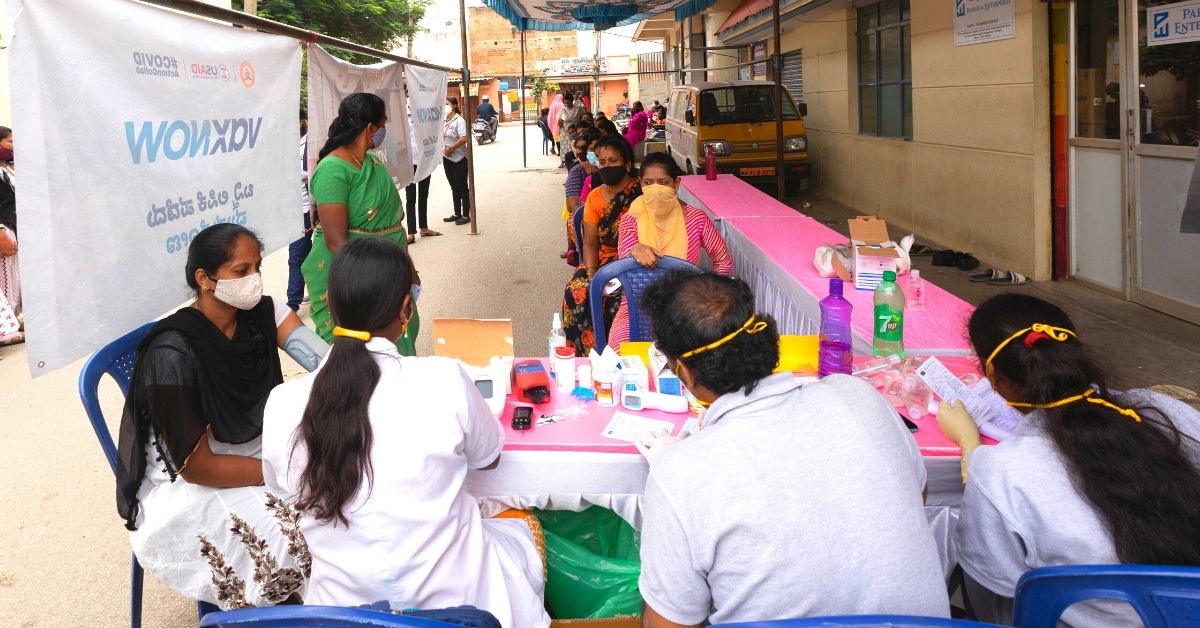
Looking Ahead
COVID-19 isn’t over and its effects on livelihoods aren’t done yet. Members of the WSW and transgender community have lost nearly two years of income. They will take another three to four years to bounce back. For the CAC, the most important focus right now is to ensure they can vaccinate as many members of the WSW and other vulnerable communities.
“Our priority is to ensure that at least 20 to 50 million of the poorest and most vulnerable Indians are double vaccinated. Our second priority is to build resilient livelihood options for these communities. By March to June 2022, we are hoping to complete our vaccination targets. After that, we don’t want to waste the community mobilisation we have done. We want to ensure that the stories you’re hearing about sex workers don’t get repeated. Whenever there is a crisis, the government and others should call upon these communities,” says Shiv.
“The problems associated with vaccination coverage are dynamic from transport, unavailability of human resources for vaccination delivery to law and order. Nobody on the ground level is doing demand generation for vaccines, which is getting people to come and take them. What makes VaxNow successful is that we collaborate with the government, private sector, media and ground level NGOs. In the spirit of collaboration, we are bringing everyone together to orchestrate a successful outcome. This is why we have reached so many,” notes Kallana.
(Edited by Yoshita Rao)
Like this story? Or have something to share? Write to us: [email protected], or connect with us on Facebook and Twitter.
If you found our stories insightful, informative, or even just enjoyable, we invite you to consider making a voluntary payment to support the work we do at The Better India. Your contribution helps us continue producing quality content that educates, inspires, and drives positive change.
Choose one of the payment options below for your contribution-
By paying for the stories you value, you directly contribute to sustaining our efforts focused on making a difference in the world. Together, let’s ensure that impactful stories continue to be told and shared, enriching lives and communities alike.
Thank you for your support. Here are some frequently asked questions you might find helpful to know why you are contributing?


This story made me
-
97
-
121
-
89
-
167











